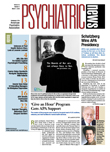Acute psychological responses to the September 11 terrorist attacks—even among people who were not at the World Trade Center or the Pentagon—predicted greater incidence of heart ailments over the next three years, according to a study that surveyed respondents' health before and after the events.
The percentage of diagnosed cardiovascular problems increased among individuals with acute stress responses to the 9/11 attacks in the three years following the attacks, from 18.7 percent to 27.3 percent. This was true even after adjustment for cardiac risk factors, exposure to the attacks, and pre-9/11 mental health, reported E. Alison Holman, F.N.P., Ph.D., an assistant professor of nursing science at the University of California, Irvine, and colleagues in the January Archives of General Psychiatry.
“Acute stress responses may have value beyond their potential for predicting PTSD,” they wrote.
Public health officials should consider the potential impact of indirect exposure to extreme stress, given that only 3.6 percent of the respondents reported direct exposure.
The data came from a nationally representative sample of 2,592 people surveyed before and after the attacks by Knowledge Networks Inc., a firm that conducts anonymous, Web-based surveys.
The participants were first surveyed beginning in June 2000. They were later asked about their psychosocial status just after the attacks and again at 12, 18, 24, and 36 months afterward. Physical health assessments were conducted at 12 and 24 months after the attacks. The surveys also asked if the respondents worried that an act of terrorism would affect them or their family in the future.
About 12 percent of respondents reported high levels of DSM-IV criteria B, C, D, and E acute stress symptoms related to the attacks. Since most were not directly exposed to the attacks, they did not meet criterion A and so were not assumed to have acute stress disorder.
These respondents were twice as likely to report being diagnosed with high blood pressure and three times more likely to have heart problems in the first or second years afterward than the rest of the sample. Pre-9/11 cardiac ailments predicted later ones, but didn't predict acute stress responses.
Among the physiological effects of short- and long-term stress are higher blood pressure, more arrhythmias, increased atherosclerosis, and greater neurohormonal arousal, said the researchers.
Early spotting of stress symptoms after similar events might help identify people at higher risk for future cardiovascular problems, suggested Holman and colleagues.
